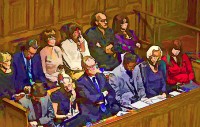Nevada Appellate Courts Advance Opinions for May 3, 2018
DOLORES VS. STATE, DEP’T OF EMPLOYMENT SEC. DIV.
- Is submitting a resignation when faced with a resign-or-be-fired option a voluntary resignation under NRS 612.380, thereby disqualifying an individual from unemployment benefits.
LAS VEGAS DEV. GRP., LLC VS. BLAHA
- Do the time limitations in NRS 107.080(5)-(6) (2010) bar an action challenging an NRS Chapter 107 nonjudicial foreclosure where it is alleged that the deed of trust had been extinguished before the sale.
COTTER, JR. VS. DIST. CT. (COTTER)
- Do documents disclosed to third parties constitute waiver of the work-product privilege.
MEI-GSR HOLDINGS, LLC VS. PEPPERMILL CASINOS, INC.
- Does NRS 600A.030, Nevada’s Uniform Trade Secrets Act (NTSA), preclude a defendant from demonstrating that certain information is readily ascertainable and not a trade secret even though the defendant acquired the information through improper means.
FITZGERALD VS. MOBILE BILLBOARDS, LLC
- Were allegedly defamatory statements made by an employer regarding an employee’s alleged abuse of the workers’ compensation program to obtain prescription pain medication, a violation of NRS 616D.300, absolutely privileged.
IN RE: MATTER OF E.R. C/W 73198
- Does a familial placement preference survive the termination of parental rights.
- Does NRS 200.604 prohibit a person from copying, without permission, a consensually recorded video depicting sexual acts.
- Did the district violate a defendant’s constitutional right to due process and his statutory right to cross-examine two examiners who had initially found him competent.
- Is striking a prospective juror based on sexual orientation permissible under the United States and Nevada Constitutions.

